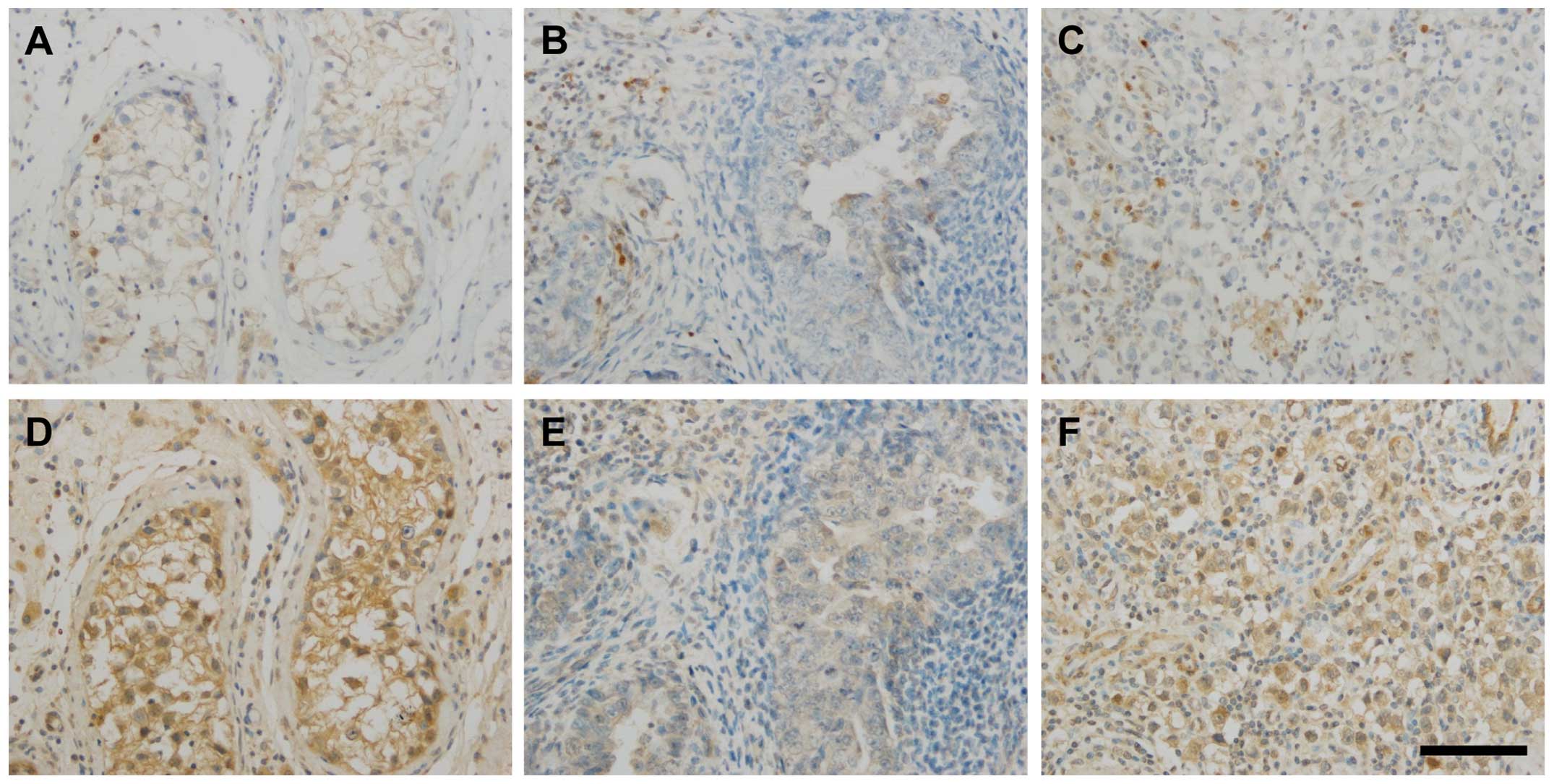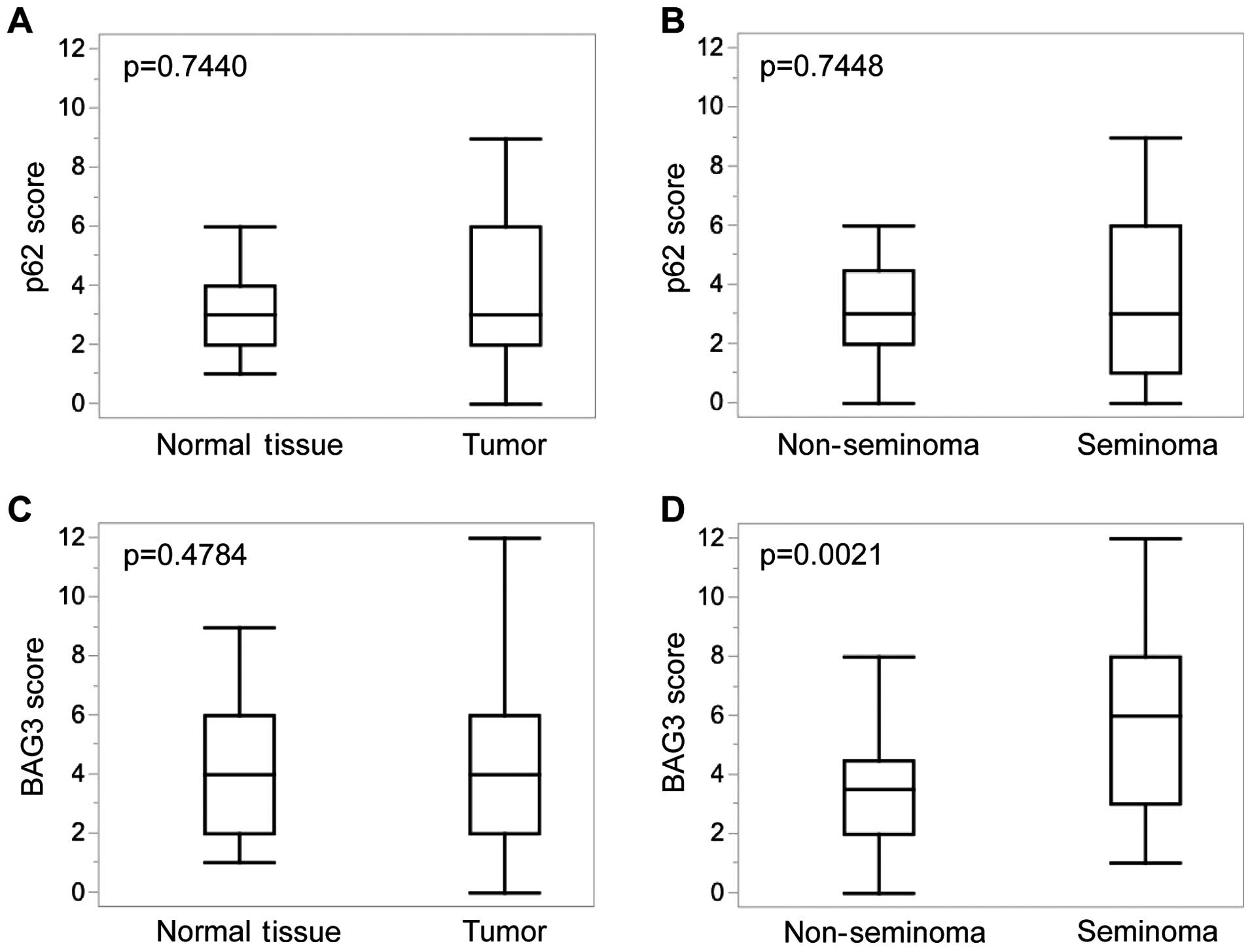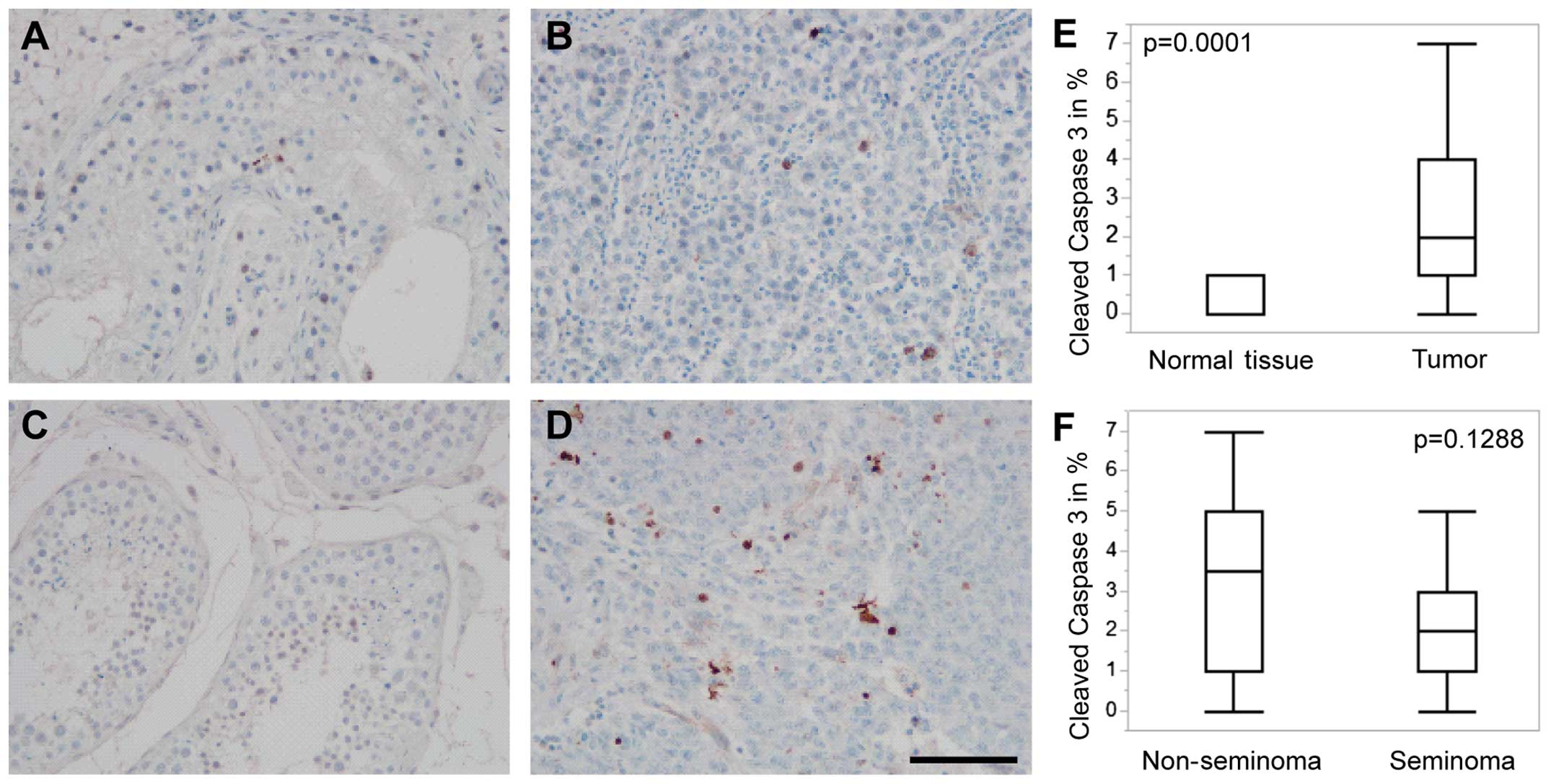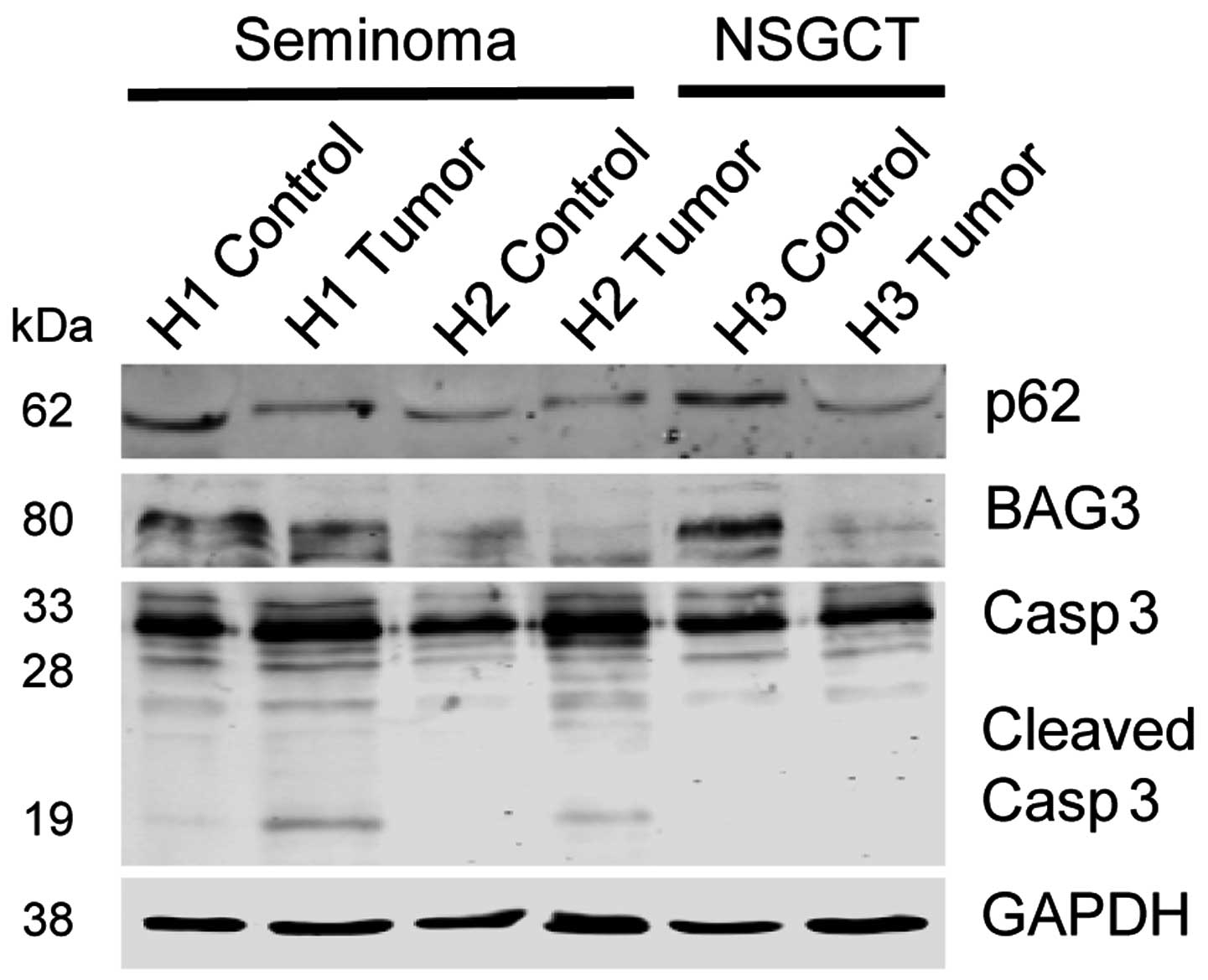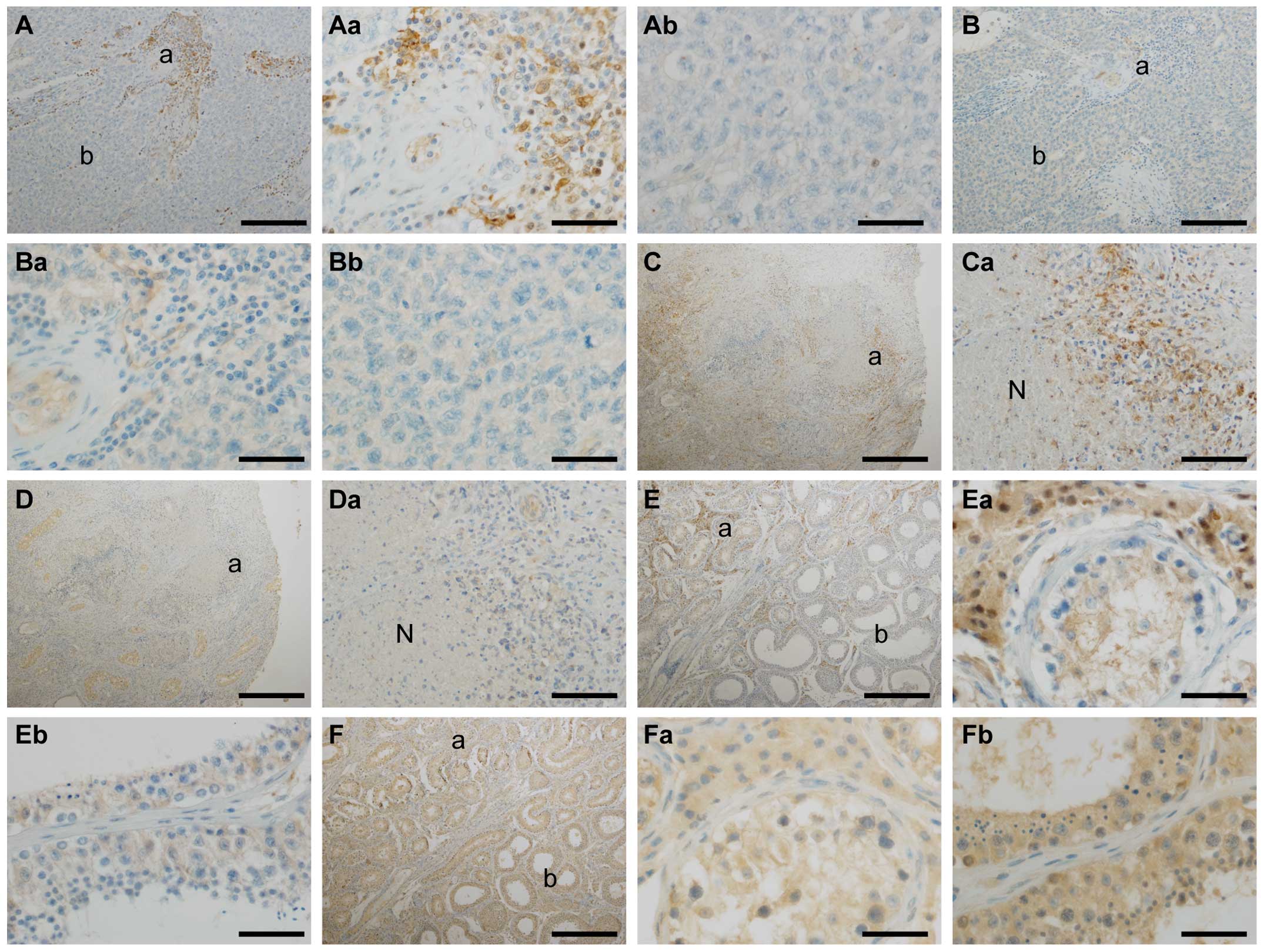|
1
|
Mayer F, Stoop H, Scheffer GL, Scheper R,
Oosterhuis JW, Looijenga LH and Bokemeyer C: Molecular determinants
of treatment response in human germ cell tumors. Clin Cancer Res.
9:767–773. 2003.PubMed/NCBI
|
|
2
|
Spierings DC, de Vries EG, Vellenga E and
de Jong S: The attractive Achilles heel of germ cell tumours: An
inherent sensitivity to apoptosis-inducing stimuli. J Pathol.
200:137–148. 2003. View Article : Google Scholar : PubMed/NCBI
|
|
3
|
Hanahan D and Weinberg RA: Hallmarks of
cancer: The next generation. Cell. 144:646–674. 2011. View Article : Google Scholar : PubMed/NCBI
|
|
4
|
Lian J, Wu X, He F, Karnak D, Tang W, Meng
Y, Xiang D, Ji M, Lawrence TS and Xu L: A natural BH3 mimetic
induces autophagy in apoptosis-resistant prostate cancer via
modulating Bcl-2-Beclin1 interaction at endoplasmic reticulum. Cell
Death Differ. 18:60–71. 2011. View Article : Google Scholar
|
|
5
|
Voss V, Senft C, Lang V, Ronellenfitsch
MW, Steinbach JP, Seifert V and Kögel D: The pan-Bcl-2 inhibitor
(−)-gossypol triggers autophagic cell death in malignant glioma.
Mol Cancer Res. 8:1002–1016. 2010. View Article : Google Scholar : PubMed/NCBI
|
|
6
|
Nakatogawa H, Suzuki K, Kamada Y and
Ohsumi Y: Dynamics and diversity in autophagy mechanisms: Lessons
from yeast. Nat Rev Mol Cell Biol. 10:458–467. 2009. View Article : Google Scholar : PubMed/NCBI
|
|
7
|
Mizushima N, Levine B, Cuervo AM and
Klionsky DJ: Autophagy fights disease through cellular
self-digestion. Nature. 451:1069–1075. 2008. View Article : Google Scholar : PubMed/NCBI
|
|
8
|
Amaravadi RK, Lippincott-Schwartz J, Yin
XM, Weiss WA, Takebe N, Timmer W, DiPaola RS, Lotze MT and White E:
Principles and current strategies for targeting autophagy for
cancer treatment. Clin Cancer Res. 17:654–666. 2011. View Article : Google Scholar : PubMed/NCBI
|
|
9
|
Gamerdinger M, Hajieva P, Kaya AM, Wolfrum
U, Hartl FU and Behl C: Protein quality control during aging
involves recruitment of the macroautophagy pathway by BAG3. EMBO J.
28:889–901. 2009. View Article : Google Scholar : PubMed/NCBI
|
|
10
|
Baumgarten P, Harter PN, Tönjes M, Capper
D, Blank AE, Sahm F, von Deimling A, Kolluru V, Schwamb B,
Rabenhorst U, et al: Loss of FUBP1 expression in gliomas predicts
FUBP1 mutation and is associated with oligodendroglial
differentiation, IDH1 mutation and 1p/19q loss of heterozygosity.
Neuropathol Appl Neurobiol. 40:205–216. 2014. View Article : Google Scholar
|
|
11
|
Harter PN, Bunz B, Dietz K, Hoffmann K,
Meyermann R and Mittelbronn M: Spatio-temporal deleted in
colorectal cancer (DCC) and netrin-1 expression in human foetal
brain development. Neuropathol Appl Neurobiol. 36:623–635. 2010.
View Article : Google Scholar : PubMed/NCBI
|
|
12
|
Baehrecke EH: Autophagy: Dual roles in
life and death? Nat Rev Mol Cell Biol. 6:505–510. 2005. View Article : Google Scholar : PubMed/NCBI
|
|
13
|
Degenhardt K, Mathew R, Beaudoin B, Bray
K, Anderson D, Chen G, Mukherjee C, Shi Y, Gélinas C, Fan Y, et al:
Autophagy promotes tumor cell survival and restricts necrosis,
inflammation, and tumorigenesis. Cancer Cell. 10:51–64. 2006.
View Article : Google Scholar : PubMed/NCBI
|
|
14
|
Roy S and Debnath J: Autophagy and
tumorigenesis. Semin Immunopathol. 32:383–396. 2010. View Article : Google Scholar : PubMed/NCBI
|
|
15
|
Galluzzi L, Pietrocola F, Bravo-San Pedro
JM, Amaravadi RK, Baehrecke EH, Cecconi F, Codogno P, Debnath J,
Gewirtz DA, Karantza V, et al: Autophagy in malignant
transformation and cancer progression. EMBO J. 34:856–880. 2015.
View Article : Google Scholar : PubMed/NCBI
|
|
16
|
Johansen T and Lamark T: Selective
autophagy mediated by autophagic adapter proteins. Autophagy.
7:279–296. 2011. View Article : Google Scholar :
|
|
17
|
Chen HY, Liu P, Sun M, Wu LY, Zhu HY, Qiao
C, Dong HJ, Zhu DX, Xu W and Li JY: Bag3 gene expression in chronic
lymphocytic leukemia and its association with patients' prognosis.
Zhongguo Shi Yan Xue Ye Xue Za Zhi. 18:838–842. 2010.In Chinese.
PubMed/NCBI
|
|
18
|
Liao Q, Ozawa F, Friess H, Zimmermann A,
Takayama S, Reed JC, Kleeff J and Büchler MW: The anti-apoptotic
protein BAG-3 is overexpressed in pancreatic cancer and induced by
heat stress in pancreatic cancer cell lines. FEBS Lett.
503:151–157. 2001. View Article : Google Scholar : PubMed/NCBI
|
|
19
|
Boiani M, Daniel C, Liu X, Hogarty MD and
Marnett LJ: The stress protein BAG3 stabilizes Mcl-1 protein and
promotes survival of cancer cells and resistance to antagonist
ABT-737. J Biol Chem. 288:6980–6990. 2013. View Article : Google Scholar : PubMed/NCBI
|
|
20
|
Rosati A, Ammirante M, Gentilella A,
Basile A, Festa M, Pascale M, Marzullo L, Belisario MA, Tosco A,
Franceschelli S, et al: Apoptosis inhibition in cancer cells: A
novel molecular pathway that involves BAG3 protein. Int J Biochem
Cell Biol. 39:1337–1342. 2007. View Article : Google Scholar : PubMed/NCBI
|
|
21
|
Behl C: BAG3 and friends: Co-chaperones in
selective autophagy during aging and disease. Autophagy. 7:795–798.
2011. View Article : Google Scholar : PubMed/NCBI
|
|
22
|
Li X, Colvin T, Rauch JN, Acosta-Alvear D,
Kampmann M, Dunyak B, Hann B, Aftab BT, Murnane M, Cho M, et al:
Validation of the Hsp70-Bag3 protein-protein interaction as a
potential therapeutic target in cancer. Mol Cancer Ther.
14:642–648. 2015. View Article : Google Scholar : PubMed/NCBI
|
|
23
|
Rapino F, Jung M and Fulda S: BAG3
induction is required to mitigate proteotoxicity via selective
autophagy following inhibition of constitutive protein degradation
pathways. Oncogene. 33:1713–1724. 2014. View Article : Google Scholar
|
|
24
|
Yao TP: The role of ubiquitin in
autophagy-dependent protein aggregate processing. Genes Cancer.
1:779–786. 2010. View Article : Google Scholar : PubMed/NCBI
|
|
25
|
Hua F, Li K, Yu JJ, Lv XX, Yan J, Zhang
XW, Sun W, Lin H, Shang S, Wang F, et al: TRB3 links insulin/IGF to
tumour promotion by interacting with p62 and impeding
autophagic/proteasomal degradations. Nat Commun. 6:79512015.
View Article : Google Scholar : PubMed/NCBI
|
|
26
|
Filomeni G, De Zio D and Cecconi F:
Oxidative stress and autophagy: The clash between damage and
metabolic needs. Cell Death Differ. 22:377–388. 2015. View Article : Google Scholar :
|
|
27
|
Romano MF, Festa M, Petrella A, Rosati A,
Pascale M, Bisogni R, Poggi V, Kohn EC, Venuta S, Turco MC, et al:
BAG3 protein regulates cell survival in childhood acute
lymphoblastic leukemia cells. Cancer Biol Ther. 2:508–510. 2003.
View Article : Google Scholar : PubMed/NCBI
|
|
28
|
Festa M, Del Valle L, Khalili K, Franco R,
Scognamiglio G, Graziano V, De Laurenzi V, Turco MC and Rosati A:
BAG3 protein is overexpressed in human glioblastoma and is a
potential target for therapy. Am J Pathol. 178:2504–2512. 2011.
View Article : Google Scholar : PubMed/NCBI
|
|
29
|
Choi J, Jung W and Koo JS: Expression of
autophagy-related markers beclin-1, light chain 3A, light chain 3B
and p62 according to the molecular subtype of breast cancer.
Histopathology. 62:275–286. 2013. View Article : Google Scholar
|
|
30
|
Kim JY, Jung WH and Koo JS: Expression of
autophagy-related proteins according to androgen receptor and HER-2
status in estrogen receptor-negative breast cancer. PLoS One.
9:e1056662014. View Article : Google Scholar : PubMed/NCBI
|
|
31
|
Elmore S: Apoptosis: A review of
programmed cell death. Toxicol Pathol. 35:495–516. 2007. View Article : Google Scholar : PubMed/NCBI
|
|
32
|
Qiu Y, Li P and Ji C: Cell death
conversion under hypoxic condition in tumor development and
therapy. Int J Mol Sci. 16:25536–25551. 2015. View Article : Google Scholar : PubMed/NCBI
|
|
33
|
Kuijper A, van der Groep P, van der Wall E
and van Diest PJ: Expression of hypoxia-inducible factor 1 alpha
and its downstream targets in fibroepithelial tumors of the breast.
Breast Cancer Res. 7:R808–R818. 2005. View
Article : Google Scholar : PubMed/NCBI
|
|
34
|
Kanamori H, Takemura G, Goto K, Maruyama
R, Tsujimoto A, Ogino A, Takeyama T, Kawaguchi T, Watanabe T,
Fujiwara T, et al: The role of autophagy emerging in postinfarction
cardiac remodelling. Cardiovasc Res. 91:330–339. 2011. View Article : Google Scholar : PubMed/NCBI
|
|
35
|
Elstrand MB, Kleinberg L, Kohn EC, Tropé
CG and Davidson B: Expression and clinical role of antiapoptotic
proteins of the bag, heat shock, and Bcl-2 families in effusions,
primary tumors, and solid metastases in ovarian carcinoma. Int J
Gynecol Pathol. 28:211–221. 2009. View Article : Google Scholar : PubMed/NCBI
|
|
36
|
Franceschelli S, Rosati A, Lerose R, De
Nicola S, Turco MC and Pascale M: Bag3 gene expression is regulated
by heat shock factor 1. J Cell Physiol. 215:575–577. 2008.
View Article : Google Scholar : PubMed/NCBI
|
|
37
|
Sheikine Y, Genega E, Melamed J, Lee P,
Reuter VE and Ye H: Molecular genetics of testicular germ cell
tumors. Am J Cancer Res. 2:153–167. 2012.
|
|
38
|
Mizushima N, Yoshimori T and Levine B:
Methods in mammalian autophagy research. Cell. 140:313–326. 2010.
View Article : Google Scholar : PubMed/NCBI
|















